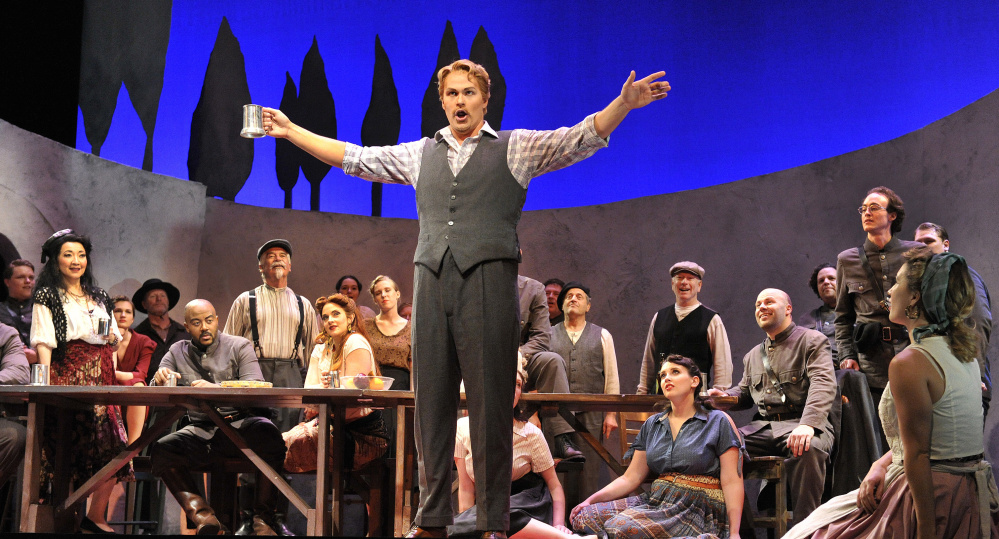It seems odd to have an opera company (or even, as it is sometimes called, a festival) with a name, a logo, an artistic staff and a board of directors, but no schedule to speak of. PORTopera presents a single, large production (and a chamber opera) in a season that runs about two weeks. Surely the minimum requirement for a company with a name should be three full productions.
Judging from the crowd at the company’s production of Bizet’s “Carmen,” which opened Wednesday evening at Merrill Auditorium (and closes on Friday), there appears to be an enthusiastic audience for opera in Portland. Are all those listeners satisfied with a single, annual work? And are they truly content to devote their annual opera night solely to warhorses – “Tosca” last year, “Carmen” this year (and for the third time in 22 seasons), and “La Traviata” scheduled for next year?
There is a vibrant world of contemporary opera out there, but at the pace PORTopera works, Portland is not likely to hear them until they’re well past their sell-by dates. This is a board issue, really: PORTopera’s estimable artistic director, Dona D. Vaughn, has a resume rich in contemporary opera and the connections to bring accomplished young singers to the company. But presenting a balanced season, with new and old works, means raising the money for at least four or five productions a year, and that’s the board’s job.
Maybe things are looking up. Unlike last year’s “Tosca,” which was virtually a concert reading, with a few props and the orchestra on the stage, “Carmen” was presented as a full-fledged production, with spare but serviceable sets by Judy Gailen and costumes by Millie Hiibel.
Everyone knows “Carmen,” right? It’s the 1875 shocker about a soldier, Don José, who forsakes his small-town sweetheart, Micaëla, as soon as he meets Carmen, a bewitching gypsy who has a factory job making smokable carcinogens and who is part of a smuggling gang on the side. José, out of his depths in Carmen’s world, compensates with a propensity for violence toward women, or at least toward Carmen, whose taste in men is unfortunate: Besides José, who knifes her to death (surely, at this point, that’s not a spoiler), she is attracted to the toreador Escamillo, whose job is dressing up in a cape and slaughtering bulls after horse-riding confederates torture them with pointed sticks. Apart from sweet little Micaëla, no one here is very likeable.
That said, Bizet’s opera does have more than its fair share of crowd-pleasing arias, duets, ensembles, choruses and orchestral flourishes. And Maya Lahyani, the mezzo-soprano who sang the title role, brings both vocal suppleness and an alluring stage presence to the production, in healthy masure. Her two first-act showpieces, the “Habanera” and “Sequidilla,” were magnificently sultry, and her account of the dark, second act card aria, “En vain pour éviter,” touched on Carmen’s tragic side without overstating it.
Lahyani dominates her scenes, which is fine, but a more balanced cast would be finer. Adam Diegel’s flexible tenor is a bit light for Don José, but he had some lovely moments – most notably his quietly passionate “Flower Song,” in Act II. Dramatically, he seemed unable to decide what to do with himself. José is confused and conflicted, but he’s also a soldier with a murderous jealous streak – not the wimpy sad sack that Diegel made him. You wanted Lahyani to channel Cher in “Moonstruck,” to slap Diegel across the face and yell, “Snap out of it!”
Edward Parks played Escamillo as an urbane bon vivant, and if his “Toreador Song” seemed slightly underpowered at first, Parks picked up energy as he proceeded, and gave strong performances in the third and fourth acts, particularly in “Si tu m’aimes, Carmen,” his final love duet with Carmen.
Amanda Woodbury’s Micaëla evolved similarly – oddly distant in Act I, but moving and beautifully rounded in “Je dis que rien ne m’épouvante,” her third act meditation on saving José from his life of ruin.
“Carmen” is a populous opera, and there were strong contributions from singers in smaller roles, among them Kenneth Kellogg (Zuniga), Jorelle Williams (Moralès), Maeve Höglund (Frasquita) and Sahoko Sato (Mercédès). The company’s choir and children’s choir also did fine work, as did the orchestra, led by Stephen Lord.
Allan Kozinn is a former music critic and culture writer for The New York Times who lives in Portland. He can be contacted at:
allankozinn@gmail.com
Twitter: kozinn
Send questions/comments to the editors.


